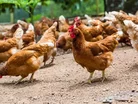Snowdale Holdings given record fine for misleading free range egg claims

The Australian Federal Court has ordered Snowdale Holdings to pay penalties totalling AU$750,000 for making false or misleading representations that its eggs were ‘free range’, in proceedings brought by the Australian Competition and Consumer Commission (ACCC).
Combined with court fees of $300,000, the penalty is the highest ever in relation to the mislabelling of eggs as free range.
Snowdale is one of Western Australia’s largest egg producers, supplying eggs labelled as cage, barn laid and free range to various retailers.
RELATED STORIES:
- Burger King and Tim Hortons parent company commits to cage-free eggs by 2025
- General Mills is switching to cage-free eggs by 2025
- Heinz in Australian Federal Court over toddler snack sugar content
ACCC Commissioner Mick Keogh said: “This is the highest penalty that a Court has ordered in relation to misleading ‘free range’ egg claims. It reflects the seriousness of Snowdale’s conduct and the importance of egg producers being truthful about marketing claims they make.
“Consumers pay a higher price for free range eggs, so when a ‘free range’ claim is made, it’s important that consumers are purchasing eggs laid by chickens in free range conditions.
“Farmers who have invested in changes to their farming practices so they can make valid credence claims such as ‘free range’ also need protection from others making false credence claims,”
Snowdale supplied eggs labelled as ‘free range’ in Western Australia under brands including Eggs by Ellah, Swan Valley Free Range and Wanneroo Free Range. Snowdale also promoted its eggs as ‘free range’ on the Eggs by Ellah website from May 2013.
In May 2016 the Federal Court found that Snowdale’s labelling of its eggs as ‘free range’ between April 2011 and December 2013 was misleading or deceptive, and amounted to false or misleading representations.
The Court found that most of the hens from Snowdale’s sheds did not go outside as the farming conditions significantly inhibited them from doing so. These conditions included the number of pop holes, the number of birds per metre of pop hole, the flock size inside the shed and the shed size.
The Court has also made an order preventing Snowdale from using the words ’free range’ in connection with its eggs unless the eggs are produced by hens that are able to go outside on ordinary days, and most of which actually go outside on most days.
Snowdale was also ordered to implement a consumer law compliance program and pay a contribution towards the ACCC’s costs.



